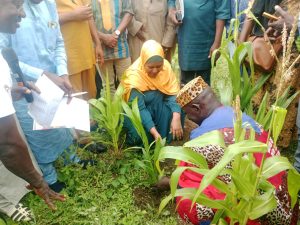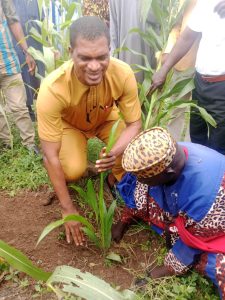How climate-impacted communities in Nasarawa take actions towards building resilience

Assalama Sidi, Executive Deputy Director, OXFAM in Africa , planting tree during the flag off of transplanting of Oil Palm trees in Akwanga LGA, Nasarawa State
By Esther Akaa, Lafia
Climate-impacted communities in Nasarawa State have leveraged the African Activists for Climate Justice Project (AACJ) capacity-building training and interventions through locally led actions in strengthening their resilience toward combating the impact of climate in their communities.

The National AACJ Project Lead and Climate Justice Project Coordinator at OXFAM in Nigeria, Kenneth Akpan(l) assisting a traditional ruler in the planting of Oil Palm Tree in Akwanga LGA, Nasarawa State
An investigation by the Nigerian Post revealed that several communities who had benefited from the AACJ Project in Nasarawa State have began application of the training by planting economic trees, briquette productionand smart agricultural practices to enhance their socio-economic status.
The AACJ project, supported by OXFAM through the Dutch Ministry of Foreign Affairs and partners, Young Men’s Christian Association (YMCA) Mada Hills and Association of Small Scale Agro Producers in Nigeria (ASSAPIN), had provided solutions-based knowledge and skills to 9 climate impacted communities in 5 Local Government Areas (LGAs) to help deal with climate change issues.
When our Correspondent visited the benefiting communities and LGAs, which include Agunji and Ngubi communities, Nasarawa Eggon LGA, Ntsakpe and Buhar Community, Akwanga LGA, Gidigidi Community, Kokona LGA, Gidan mai Akuya, and Barkin Abdullahi community, Lafia LGA and Musha community , Obi LGA, saw community members taking measures toward reducing climate change impacts.
The climate adaptive measures taken include tree planting, briquette production, workshops, linkages to financial platforms and initiated community-saving and loan groups for access to loans, among others.
A beneficiary of the Lafia community, Mr Terhemba Ajav said, the organisations intervened in the community through the establishment of oil palm plantations by training members on how to establish oil palm nurseries and plantations.
Ajav explained that YMCA and ASSAPIN through the support of OXFAM in Nigeria donated 1,500 sprouted oil palm seedlings each to Gidan Akuya and Barkin Abdullahi communities in Lafia LGA to support their local community self-help initiatives in reducing the incidences of tree cutting and its consequent environmental impact on the society.
“In Barkin Abdullahi community, we were able to transplant 1,300 plants to the permanent site, while in Gidan Akuya, some seedlings were destroyed by livestock but we were able to secure the area to protect the remaining seedlings which were transplanted,” he said.
He said with the training on oil palm seedling cultivation and linkage to the reliable source of the seedlings, community members on their own are already acquiring the seedlings and planting them on their own.
Ajav explained that the plantation would help in mitigating and checking the incidences of flooding and other environmental challenges the people of the community have been facing over time.
According to him, the seedlings when fully developed and harvested would be a veritable source of economic empowerment to people of the community.
Ajav said the AACJ training had changed the perception of the people towards cutting down trees as communities began planting economically viable trees such as mangoes, cashews, Guava and others to mitigate the negative impact of climate change such as hot temperature and erosion in their environment.
“We are very happy with the implementers of the AACJ project because we have so far received training on how to plant trees to mitigate the effects of climate change and also improve our livelihoods,” he said.
Leader of the Ntsakpe Community in Akwanga LGA area of the State, Hon. Magson Anthony Zarmo said the AACJ project taught the community members how to make briquettes as an energy source which serves as a veritable alternative to charcoal or firewood.
Zarmo said the introduction of an alternative source of energy for cooking has reduced the felling down of trees for charcoal production and reduced the stress on women when cooking.
“Briquette making is easier because what we do is to gather all husks from harvests like maize and rice stems for briquette production instead of burning them as we use to as farm waste.
“We have stepped down the training of briquette making to the members of the community, It is easy to use and cheaper when compared with gas which many people cannot afford due to the economic crisis Nigeria is experiencing at the moment.
“This has also helped the women, especially from going long distances to fetch firewood or buy charcoal, and has also minimised the cutting down of trees discriminately,” he said.
The community leader stated that the youths are beginning to be involved in briquettes production and the development is getting positive results even as he assured that the community would sustain it.
Also, a youth leader in Agunji Community, Nasarawa Eggon LGA of the State, Mr Jonathan Attah Allu, said the AACJ project trained members of his community on how to Plant trees from a nursery and transplant them to the permanent site.
“We planted 1,500 palm seedlings at the nursery stage and later distributed them across the community for transplanting. Already individuals have planted 5,052 trees in the community, and about 120 cashew trees were planted recently by individuals in the community.
“People are now planting other trees on their own to checkmate erosion and flood unlike before when they were engaged in cutting down trees without replacement.
“The community stands the chance of benefiting from this AACJ project even in the future because the trees will begin to produce fruits. Cashew is an economic tree and so it will provide both income and food to the people.
Allu explained that the community is adapting the policy to protect seedlings by planting other crops like cassava as an innovation to safeguard the oil palm plantation to prevent animals from destroying the oil palm nursery.
He said the AACJ project also initiated savings and loans, which have uplifted the income of members of the community greatly.
Mrs Esther Rize Katungu from Kokona LGA said the community members were trained on how to raise the palm tree nursery, and that has made us to step-down the training to other communities.
Mrs Katungu said the AACJ project provided their community with 1,500 sprouted oil palm seedlings which they were able to raise 1,350 from the nursery to the permanent site while others did not germinate.
According to her, when the oil palms trees are fully grown, they will be used for palm oil production, which serve as a source of food and income for the community.
Speaking on the impacts of the AACJ project in Nasarawa state, the Director of Climate Change, Ministry of Environment and Natural Resources, Mr Angbashim Ishaku, said the project had impacted positively on the various communities where it has been implemented.
Angbashim said OXFAM, YMCA and ASSAPIN with funding support from the Ministry of Foreign Affairs of the Netherlands, have carried out activities such as capacity building and training on briquette production, which has provided a source of cooking fuel for the grassroots women and youths across the communities in the state.
The Director also said that the project developed climate change policy for the state and the government was working towards its implementation to address some of the climate change effects on citizens of the state.
He, therefore commended OXFAM, YMCA and ASSAPIN for implementing the AACJ project in the state and assured of the continuous support of the state government to address climate change effects for the overall well-being of citizens of the state.
On his part, Executive Secretary YMCA, Mr. Ango Adamu, stated that although the project will be ending by 2025, sustainable measures will be implemented to continue the project after its expiration.
According to Adamu, the actions include the creation of climate change clubs in educational institutions, the involvement of women and young people, and support from traditional leaders and climate change volunteers.
“The communities on their own have started a community and individual nursery establishments for domestic use and income generation, step-down training efforts, reached out to a wide range of audience, engagement of other organisations working on climate change in the state.
“The oil palm trees can live between 40 to 50 years after AACJ, its benefits will still be enjoyed by communities and their children to come.
“The project has promoted unity by bringing individuals and communities, unifying their thoughts to engage duty bearers representing them in parliaments, increased in confidence and public speaking abilities.
“Better understanding and personal actions taken by community volunteers are positive steps that justify time and resources invested in the AACJ project in Nasarawa State,” he said.
Speaking as well, Kenneth Akpan, the National AACJ Project Lead and Climate Justice Project Coordinator at OXFAM in Nigeria, said that the project which is currently running in Eight African countries of which Nigeria is one, had involved partners, stakeholders, and communities in amplifying the voices of marginailised communities in Africa and strengthening their capacity to address climate change issues and adapt to it.
According to Akpan, the project, which is fund by the Dutch Ministry of Foreign Affairs and implemented in the state by OXFAM in Nigeria in collaboration with YMCA and ASSAPIN, worked with a number of youth and women organisations as well as local communities to address the effects of climate change and help people live decent, dignified lives in a healthy, sustainable environment.
He said” AACJ project is involved in policy influencing to see how government and other stakeholders including private sectors, can take climate issues seriously and enact laws and policies that will help shape the state government’s preparedness and take actions on climate change.
” We have so far pushed for climate change act for Nasarawa State, which was co-designed by one of our implementing partners.We have also helped the people to build capacity in what we call community development plans. These plans help them to identify key issues and gaps and also identify stakeholders including how to engage with their duty beares and hold them accountable which has yielded some positive results where communities mobilised and got the attention of government to improve their power source and built a bridge through community efforts, this has helped in showcasing their potentials in addressing some of these issues at community level.
“We have also sharpened their knowledge and understanding of climate change issues because most people have always seen climate change as a myth and being scientific or too difficult to understand, but these are realities that live with us.
“Community education on climate change has been ongoing on the media platforms including TV and radio as well as engaging the youth at a young age through school debates and sports are some of the ways to build community knowledge and interest on resilience to climate change issues.”
The AACJ Project Lead in Nigeria noted that as a result of the project implementation, women were producing briquettes as a source of energy instead of the customary firewood, which encouraged the chopping down of trees indiscriminately leading to massive deforestation and it’s attendant negative impact on the environment leading to adverse climate conditions.
In order to help people maximise their space in the face of flooding and the increased incidence of insecurity in the nation, Akpan explained that the project has also supported the initiatives of planting trees and smart agriculture, including sack farming with special emphasis to People With Disability ( PWD) as a more friendly model to their contributing to food security.
He expressed happiness that the AACJ project was helping communities, saying that the beneficiaries of the project are already taking the lead by adopting sustainable practices in their own areas.




